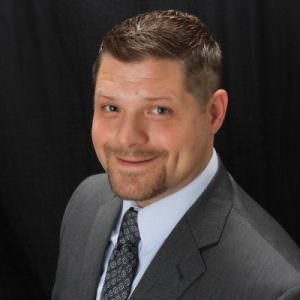SIA RISE Profile: Tim Wenzel of Facebook

 Read our interview with Tim Wenzel, CSPM®, Program Manager, Special Projects & Residential Security, Facebook, as the Security Industry Association (SIA) spotlights a young professional on the RISE!
Read our interview with Tim Wenzel, CSPM®, Program Manager, Special Projects & Residential Security, Facebook, as the Security Industry Association (SIA) spotlights a young professional on the RISE!
Are you a young security professional under 40? We want your story! Contact Bryan Miller at bmiller@securityindustry.org to be featured in a monthly profile!
What first got you interested in security and safety as a career choice?
I began as a healthcare professional working in hospitals, blood banking, and EMS. I tend to get bored quickly at work, so I developed three criteria for accepting positions.
I don’t want to do the exact same thing over and over again every day. There must be variety in the job, clientele or environment.
The job must be mentally challenging and performance-based. I want to solve problems and have the opportunity to “be the best” any given day. This gives me tangible short-term goals.
I will not accept a job that I’m “fully qualified” for. To me, it makes no sense to accept an offer with no promise of a significant amount of learning or “figuring it out.” There is no opportunity for career progression in these environments.
After returning from National Guard deployments to Nicaragua, Italy and Iraq, the healthcare routine began to feel dull. I needed a change of pace, so I took a security job to reset. While there, I learned about the executive protection industry—specifically how medical professionals were in high demand. I met people who led interesting lives and truly loved their careers.
Growing up in a farming community in Illinois, this was foreign to me. People had jobs or careers to support their family. No one really “loved” their job. I was intrigued, and it started my pursuit of an interesting life.
What has your career path been?
While in high school, I joined the Army National Guard as a medic. During my 10 years in healthcare, I was a phlebotomist, EMT, paramedic and a remote medical officer. At 19 years old, I was asked to revise and teach a phlebotomy certification program to the nursing staff at the hospital where I worked. Healthcare taught me how to perform consistently under stress and accept responsibilities that are outside of my comfort zone.
Skipping forward to 2007, I began to explore the security industry. I returned to Iraq as a civilian contractor to provide medical support to security teams and organizations. While I’ve never been a real “type A” guy, I did enjoy the dynamic environment and challenges that accompany working in a combat zone. Between my Army and contract deployments, I found myself in Iraq for most of my 20s.
At the end of 2010, I came home to find a security job. I moved to the Washington, D.C. area and began providing executive protection services for foreign diplomats living in there. I began to network heavily and do side work in an effort to become known. This was one of the most important moves I made early in my career. By taking any short-term job that came up, I was able to work with different people and personalities and learn about the many aspects of the protective security industry.
In 2012, I became an instructor for the Diplomatic Security Service, U.S. Department of State. We were teaching diplomats going to Iraq about security and how State contributed to the success of their individual missions. Basically, we were teaching future principals how security programs provided a tangible benefit to their jobs. Then Benghazi happened. My team was tasked to develop new training for all diplomats deploying to “high-threat regions.” This was my introduction to high-profile project management.
In 2013, I came to Facebook on contract, and in 2015 they hired me as an employee. During my three years at Facebook, I’ve redeveloped parts of their executive protection program and their entire residential security program, and I started their special projects program. Today, EP Special Projects has grown to include a security technology R&D program. We develop boutique concepts and applications that will define how security technology is thought of and applied in the future.
Who has influenced you or mentored you—either within the security field or outside?
I have been blessed to have several people guide me in significant ways, both personally and professionally.
When I was working overseas, my manager J.J. Golden was instrumental in forcing me to evaluate my positions, ideas and thought processes—even when he agreed with me. He helped me understand that having the right answer or solution wasn’t enough. You need to understand how to guide other people to the same place.
Bob Faber, a good friend, spent his life in law and politics. He helped me understand the D.C. arena and how to navigate it. He helped me learn how to form partnerships as an approach to problem solving. In the process, he was able to knock some of the brashness off of me.
Upon joining AS Solution at Facebook, Brian Jantzen taught me how to thrive in the corporate ecosystem, to create a brand for myself and to use kindness to achieve success. As busy as things were, he always took time to counsel me on reaching my audience or designing a new program.
On the career front, Ray O’Hara has taken me under his wing. He has helped me plan my career path, introduced me to industry leaders, and found me opportunities to grow professionally. He’s also helped me see the bigger picture of how a career can fit into an industry. After all, an industry will not mold itself to your career.
What do you think you need to enhance your career?
To enhance a career, you need a strong dose of constructive discontent. Even when things are great, you should find areas you can improve upon. Ask your boss, colleagues and professional contacts. We all see areas for improvement in other people, even people we love to work with. The trick is receiving the feedback happily and working toward improvement.
Another helpful exercise is to think ahead to your next job. This should be done regularly. Guess what? Our taste in work changes as we walk our career path! What you wanted three years ago may be work that has become mindless, even if it pays well. As you identify the main themes of your future job, try to find creative ways to bring them into your current job. This keeps things fresh and motivating and often helps bring value to your current organization.
Finally, don’t forget to pay it forward. All the lessons you learn and help you receive should be given freely to others within your sphere of influence. This is great practice in learning about others’ struggles and perspectives. It also helps others begin to see you as a leader.
Any advice to young professionals just starting out in the industry?
Integrity is your most important skill set. You will be a trusted person, privy to sensitive information and relied upon to make sound judgements. If you want to do well, every step and choice should be made with one goal in mind: To be above reproach. Will your colleagues believe you are capable of misconduct?
Define your success. What is a career goal that excites you? Early on, my goal was to establish myself to the point where I didn’t need to look for work any longer. Through networking, prioritizing integrity, and trying to be a joy to work with, I’ve reached that goal. I haven’t applied for a job, without first being approached by an insider, since 2011.
Take chances—they’re worth it! If an opportunity is presented to you, chances are, someone thinks you can do it. Don’t worry about failure—that’s going to happen no matter how safe you play it. Looking back, I can think of several times when I’ve been really disappointed in myself. Many of those times, I was working with the aftermath of a project that was offered to me first. It’s a terrible feeling when you realize your attempt probably would’ve produced a better product. Even if it didn’t, I robbed myself of the chance to try it out.
Be thankful for the haters. We have all worked with people who seem intent on making life difficult. All your attempts to befriend, appease or cater to them fail. Why do they have to make things so difficult? Take a deep breath and look at the big picture. These people allow you to build your character. Life is full of difficulties! Learn the lessons that are presented to you. I actually include these people as some of my biggest influencers. They’ve shown me strategies, personalities and methods that should be avoided, recognized and mitigated in the future. These people are leadership coaches! Value and grow from these experiences.
The views and opinions expressed in guest posts and/or profiles are those of the authors or sources and do not necessarily reflect the official policy or position of the Security Industry Association (SIA).
